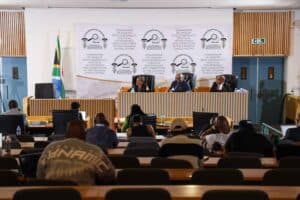Led by President Cyril Ramaphosa, the parliamentary political leaders firmly buried their differences to present a united front in the face of the common threat posed by the coronavirus pandemic.

Many times in the past few years, you will have seen The Citizen criticising South African politicians for the way they talk a lot and only do a little – and about how they seem to put their own selfish interests before those of the nation.
This newspaper never thought we’d say this, but yesterday, all of the political parties showed the sort of leadership expected – and the nation desperately needs – in a time of national, and global crisis.
Led by President Cyril Ramaphosa, the parliamentary political leaders – starting with Democratic Alliance interim leader John Steenhuisen and followed by Economic Freedom Fighters leader Julius Malema – firmly buried their differences to present a united front in the face of the common threat posed by the coronavirus pandemic.
All pledged to back the government in whatever measures it has taken – and whatever it may need to take in the future – to slow down the spread of the virus and to reduce as much as possible the coming immense burden on health services.
Make no mistake: this is the calm before the storm.
Already, as of yesterday, there were 116 confirmed cases of Covid-19 infection … and this number is likely to grow exponentially by the day.
In some countries, like the United States and the United Kingdom, politicians are still using the pandemic as ammunition to snipe at their political foes, so it is gratifying that our representatives are showing maturity and solidarity.
Irish Prime Minister Leo Varadkar, in his St Patrick’s Day speech, put it simply when he said the virus is “the shared enemy of all humanity”.
Covid-19 respects no religion, no race, no political creed and no gender.
It may well be an awful curse, but it should serve to remind all of us that, under the skin, we are all human beings and that what separates us is born in the fevered imaginings of our own minds.
And, if our politicians can do it, then why can we, as ordinary South African citizens, not put aside our differences, our prejudices and our selfishness?
Even though we, personally, may not be badly affected if the virus finds us, we need to follow the strict protocols of personal, workplace and household hygiene which have, in many countries, been the key interventions which helped turn the course of the virus. We must also self-isolate if there is any possibility we either have the virus, or have been in contact with someone who is infected.
By doing this, which is nothing less than our civic duty, we are helping to reduce the chances that others less healthy than us – those with compromised immune systems who will be hardest hit by the infection and its ancillary effects, and who could die – are infected.
We would also like to ask those who are shamelessly profiteering from a potential tragedy – those hiking the prices of essential health requirements – whether the money you make is worth selling your soul.
Likewise, to the hoarders and panic buyers: you may be inconveniencing or, worse, hurting others who are less fortunate.
Varadkar said, to his people, that now is the time to “come together as a nation by staying apart”.
We would add to that: It is times like this which show whether a country is a nation, or just a motley collection of selfish people and agendas.
The answer to that will determine South Africa’s place in history.
For more news your way, download The Citizen’s app for iOS and Android.






